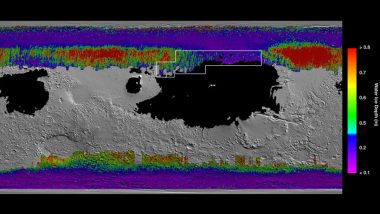Mumbai, August 13: In the recent findings published in the Proceedings of the National Academy of Sciences (PNAS), scientists have discovered a reservoir of liquid water on the planet Mars. The discovery was made using US space agency National Aeronautics and Space Administration (NASA)'s Mars InSight Lander. The discovery, which was announced on August 12, is ground-breaking. Although there was evidence of water vapour in the atmosphere of Mars as well as frozen water/ice at the Martian poles, this is the first time that liquid water has been found on the planet.
However, the water reservoir discovered on Mars is underground, located 10-20 km deep in the crust of Mars, and the possibilities of it being extracted and used for missions or Martian colonisation is minimal for now.
How Was Liquid Water Discovered on Mars?
The discovery of liquid water on Mars was made after analysing a plethora of data from the InSight Lander's record of Martian earthquakes. The Lander used its seismometer to record the vibrations of around 1,319 marsquakes during its four year post-mission stay on Mars. It is this data that scientist analysed along with the planetary movements of Mars to discover the possibility of liquid water in the crust. The BBC reports that Professor Michael Manga from the University of California, Berkeley, who is involved in the research, said that the NASA mission used the same techniques we use to prospect for water on Earth, or to look for oil and gas. Since the InSight probe only records crustal data directly below its feet, the researchers are of the opinion that similar reservoirs of liquid water could very well be found over the entire planet of Mars. If this held true, there could be a possibility of enough liquid water on Mars, forming half-a-mile thick layer across its surface. NASA Astronauts Sunita Williams and Butch Wilmore Stuck in Space: How Long Can Astronaut Stay in Space? What Health Risks They May Face? Here’s What You Should Know About Human Spaceflight.
What Are the Implications of Water Found on Mars?
The NASA InSight Lander discovery opens up scope to explore another persisting question—of the possibilities of life on Mars. Professor Manga said, "Without liquid water, you don't have life. So, if there are habitable environments on Mars, those may be now deep underground." Thus, this discovery by NASA could lead to evidences for the ongoing research on life on Mars. The study further shows that the Martian surface, a desert since 3 billion years now, is marked with dried-up channels and ripples, indicating the presence of rivers and lakes on the planet in the past.
As per the BBC, Dr Vashan Wright, Lead Researcher at the UC San Diego’s Scripps Institution of Oceanography said, "Understanding the Martian water cycle is critical for understanding the evolution of the climate, surface and interior." With water being the most important molecule for the evolution of life, this finding probes the question, "Where did all the Martian water go?" On this, Professor Manga pointed that some of it could have been lost to the Martian atmosphere in the form of vapour. It can be now believed that Mars' underground reservoirs could be harbouring some form of life.
NASA’s Insight Lander Discovers Liquid Water on Mars
Using seismic activity to probe the interior of Mars and data from @NASA's Insight lander, geophysicists have found evidence for a large underground reservoir of liquid water — enough to fill oceans on the planet’s surface. https://t.co/ZDaOowRBrj
— UC Berkeley (@UCBerkeley) August 12, 2024
More on NASA’s InSight Lander
The Interior Exploration using Seismic Investigations, Geodesy and Heat Transport (InSight) was a 2018 NASA Mission from its Discovery Program. It placed a single geophysical lander-probe on Mars' Elysium Planitia area to study the deep Martian interior and report its findings back to earth. The mission ended in 2022 after four years of collecting data on the surface of Mars. The data lead to the understanding of the geomorphic processes that shape rocky planets of the inner solar system like Earth. NASA Lunabotics Challenge 2024: US Space Agency Calls on Innovators From Colleges To Showcase Their Engineering Prowess, Know How To Apply.
With the findings of liquid water on Mars, it can now be believed that its underground reservoirs could harbour some form of life. "It's certainly true on Earth − deep, deep mines host life, the bottom of the ocean hosts life... We haven't found any evidence for life on Mars, but at least we have identified a place that should, in principle, be able to sustain life," Professor Manga said.
(The above story first appeared on LatestLY on Aug 13, 2024 04:55 PM IST. For more news and updates on politics, world, sports, entertainment and lifestyle, log on to our website latestly.com).













 Quickly
Quickly





















